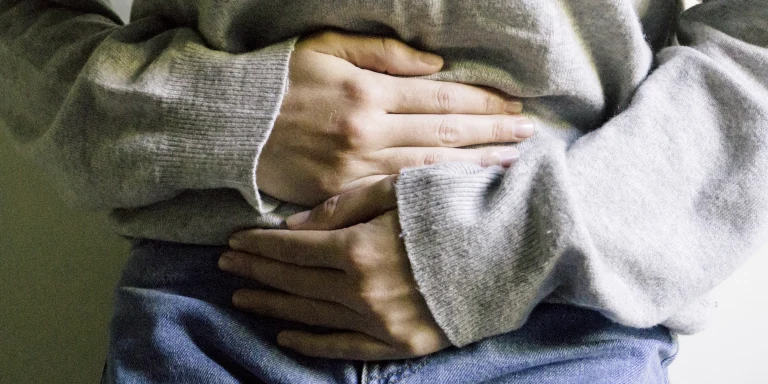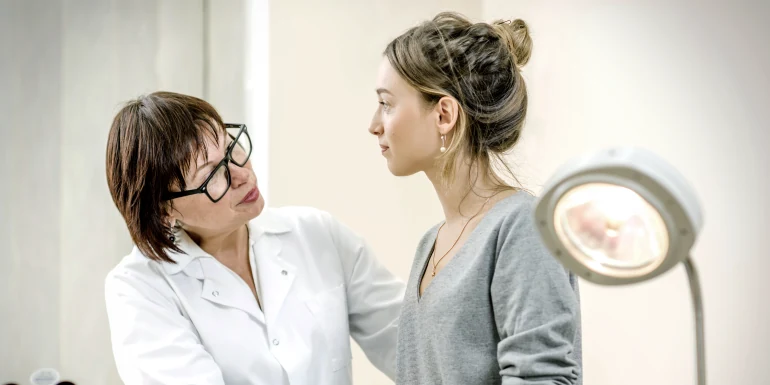
Menstruation explained: what happens in the body?
Menstruation is the first of four phases in the female menstrual cycle. But what exactly happens during a period, and how much blood is lost at this time? Here, you will learn all you need to know about menstruation during puberty and later in life.
What is menstruation?
Menstruation is also known as a (monthly) period or as menses. It is a natural process in the female body that usually occurs for the first time during puberty. Generally speaking, menstruation happens on a monthly basis until the menopause. Women and teenage girls can perceive their periods in different ways as the experiences associated with them are very individual.
What happens during your period?
Menstruation is a shedding process in the body. In each cycle, a mature egg is discharged from an ovary during ovulation and then passes through the fallopian tube towards the womb. In preparation for a potential pregnancy, the mucous membrane on the inner wall of the womb builds up to accommodate the egg. If the egg remains unfertilised, the mucous membrane dies and detaches from the womb wall. The womb is cleaned in preparation for the next cycle: the muscles contract in an irregular rhythm and relax again in order to discharge the detached womb lining, along with some blood and mucus, through the vagina. A regular period lasts between three and seven days.
A typical menstrual cycle lasts around 28 days, but it is normal for this to vary between 21 and 35 days. During the cycle, the female body prepares for a potential pregnancy. This process is controlled by hormones. Stress, a change in diet, travelling and other factors can all have an influence on the cycle. This means that it is possible for menstruation to happen earlier, later or not at all.
During puberty, it can be normal to skip periods or for periods to take place at irregular intervals. If periods are irregular during puberty, this can be caused by the body having to adjust to the hormonal changes it is going through. Therefore, having an irregular cycle during puberty is no cause for concern. However, if your cycle remains irregular in the long term or if you experience accompanying issues, it may be worth talking to a doctor about this.
At what age do periods start?
The first period in young girls is called menarche and, for girls in Switzerland, it usually occurs between 9 and 14 years of age. Researchers believe that body mass index has a connection with the onset of menstruation. The higher the body fat percentage, the earlier menstruation begins. The average time between the first and last menstruation is 37.1 years.
How long does a period last?
On average, menstruation lasts for between three and five days. However, this does vary from one person to the next and can even differ from cycle to cycle. A range of factors influence the length of your period, including hormone fluctuations, age, lifestyle and general health. Many women experience a change in the length of their periods when going through stressful times or when making certain lifestyle modifications. Periods can also vary in length during puberty. Listen to your body and reach out to a doctor if you have any concerns.
How much blood do you lose during your period?
Even though it may feel like more, the amount of blood lost during menstruation is normally only 40 to 60 ml, which is approximately ten teaspoonfuls. As a rule of thumb, with “normal” bleeding, you should need to change your tampon or towel less than every two hours.
It is not uncommon for blood clots to be in the blood lost during your period. These are made up of thickened blood and tissue. Blood clots like this are normal during your period. In particular, menstrual blood can contain blood clots during a heavy period.
Spotting may also occur before and after your period. They are a sign that your period will start soon or occur as your period comes to an end. Spotting generally only happens for a short time. Many women even experience spotting instead of a regular period. This is particularly the case in phases of hormonal change. If you are regularly experiencing spotting, then it is best to discuss this with your doctor so that any possible causes can be identified.
Tip: using a period calendar, such as on an app, will let you gain an overview of how regular your menstruation is. You can also use it to track the amount of blood lost during menstruation.
Doctors talk about ‘heavy’ bleeding when the amount of blood is more than 80 ml. This is also called hypermenorrhoea and affects about 10 in every 100 women. If bleeding lasts longer than five to seven days, it is also regarded as prolonged bleeding (menorrhagia). Hypermenorrhoea and menorrhagia often occur together, as the cause is the same: the womb cannot properly contract. Reasons for this include larger benign tumours such as myoma in the womb muscle, or mucosal polyps.
If you feel that your periods are particularly heavy, you should speak to your doctor about this. It can sometimes be the case that endometriosis is the cause.
What does the colour of menstrual blood tell us?
The colour of the blood can be used to draw conclusions about your health. If the blood is deep red, everything is fine. It is mainly brownish near the end of your period or at the very beginning, when old blood is discharged. Light-coloured blood can indicate low oestrogen levels and nutritional deficiencies, and orange-grey blood is usually a sign of an infection. In this case, you should consult your gynaecologist.
Periods: what are the signs?
The days leading up to a period put a strain on many women and cause a variety of physical and mental discomforts: abdominal cramps, headaches or even migraines and joint pain, fatigue and hypersensitivity are just a few examples. These symptoms are known as premenstrual syndrome – or PMS for short.
Women each experience their periods in very different ways. In any case, it is important to pay attention to the signals from your body and to seek medical advice if you experience symptoms that are severe or out of the ordinary.

The expert provided the editorial team with advice and input for this article. Nadia Cifarelli (BSc Psychology, certified holistic health advisor) works for the Helsana health consultation service. She helps customers on issues to do with prevention, nutrition and mental health.


Newsletter
Find out more about current health issues every month and get all the information you need about our attractive offers from all Helsana Group companies * delivered by e-mail to read whenever it suits you. Our newsletter is free of charge and you can sign up here:
We did not receive your information. Please try again later.
* The Helsana Group comprises Helsana Insurance Company Ltd, Helsana Supplementary Insurances Ltd and Helsana Accidents Ltd.